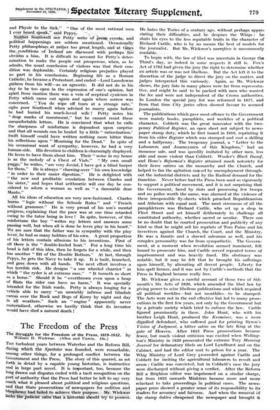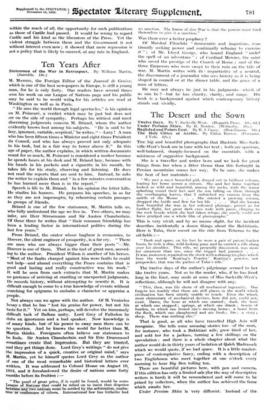The Freedom of the Press Struggle for the Freedom of
the Press, 1819-1832. By William- H. Wickwar. -(Allen and Unwin. -16s.) Tim turbulent years between Waterloo and the Reform Bill, - during which the Spectator was founded, were remarkable, among other things, for a prolonged conflict between the Government and the Press. The story of this quarrel, as set forth in detail by a capable young historian, is instructive and in large part novel. It is important, too, because the long drawn out disputes ended with a tacit recognition on the Part of authority that the Press had better be left to say very much what it pleased about political and religious questions, and that State prosecutions of newspapers for sedition and blasphemy had failed to achieve their purpose. Mr. Wiekviar lacks the judicial calm that a historian -should"try td possess.
He hates the Tories of a century_ ago, without perhaps app&e. elating their difficulties, and he despises the Whigs : he shuts his eYes to the less reputable traits in the character of Richard Carlile, who is by no means the best of models for the journalist. But Mr. Wickwar's narrative is uncommonly readable.
To begin with, the law of libel was uncertain in George the Third's day, as indeed in some respects it still is. Fox's Act of 1792 had given the jury the right to determine whether an article was or was not libellous. But the Act left it to the discretion of the judge to direct the jury on the matter, and judges interpreted this variously. Again, as Mr. Wickwar shows, the jury lists in many places were far from representa- tive, and might be said to be packed with men who wanted the fee and were not independent of the Crown authorities. In London the special jury list was reformed in 1817, and from that time City juries often showed favour to accused journalists.
The publications which gave most offence to the Government were mainly books, pamphlets, and weeklies of a political character. Cobbett was the great innovator with the two- penny Political Register, an open sheet not subject to news- paper stamp duty, which he first issued in 1816, reprinting it from his older Register which was stamped and cost a shilling and a halfpenny. The twopenny journal, a " Letter to the Labourers and Journeymen of this Kingdom," had an immense sale, and was speedily imitated by other men, less able and more violent than Cobbett. Wooler's Black Dwarf, and Hone's Reformist's Register attained much notoriety for their fierce satires on the monarchy and the Church, and helped to fan the agitation caused by unemployment through- out the industrial districts and by the Radical demand for the franchise. Never before had the Press been used so vigorously to support a political movement, and it is not surprising that the Government, faced by riots and possessing few troops and no police worth the name, was alarmed at the violence of these irresponsible fly-sheets which preached Republicanism and Atheism with equal zeal. The most strenuous of all the pamphleteers was Richard Carlile, who set up a shop in Fleet Street and set himself deliberately to challenge all constituted authority, whether sacred or secular. There can be no doubt that he courted prosecution and publicity of any kind so that he might sell his reprints of Tom Paine and his invectives against the Church, the Court, and the Ministry. He was a fanatic and a shrewd salesman as well, and his complex personality was far from sympathetic. The Govern- ment, at a moment when revolution seemed imminent, felt bound to prosecute him, and Carlile served•repeated terms of imprisonment and was heavily lined. His obstinacy was notable, but it may be fett that he brought his sufferings upon himself, by alienating all decent people. Liberty for him spelt licence, and it was not by Carlile's methods that. the Press in England became really free.
Mr. Wickwar gives a careful account of those two of Sid- mouth's Six Acts of 1820, which amended the libel law by giving power to seize libellous publications and which required all political weeklies—but not monthlies—to be stamped. The Acts were not in the end effective but led to many prose- cutions in the first few years, not only by the Government but by a private society which tried to enforce the law. Carlile figured prominently in these. John Hunt, who with his brother Leigh Hunt, produced the Examiner, was a more dignified defendant, who suffered gaol for printing Byron's Vision of Judgment, a bitter satire on the late King at the gate of Heaven. After 1825 Press prosecutions became fewer, but much violent criticism was excited when Welling- ton's Ministry in 1829 prosecuted the extreme Tory Morning Journal for defamatory libels on Lord Lyndhurst and on the Cabinet, and had the editor sent to prison for a year. The Whig Ministry of Lord Grey proceeded against Carlile and Cobbett for inciting the agricultural labourers to revolt and arson : Carlile was convicted, but in Cobbett's case the jury were discharged without giving a verdict. After the Reform Bill a Brighton editor was imprisoned on a similar charge, but from 1833 onwards Miniuters became more and more reluctant to take proceedings in political cases. The news- paper press showed a greater sense of its responsibility to its residers for accuracy_ and fabiness. And when the removal Of tbe stamp duties cheapened the newspaper and brought 4 within the reach of all, the opportunity for such publications as those of Cathie had passed. It would...be wrong to regard C,arlile and his kind as the liberators of the Press, Yet the violent struggle. betiveen them and the Government is not without interest even nciw ; it showed that mere repression is not a policy that is likely to succeed, at any rate in England.



















































 Previous page
Previous page